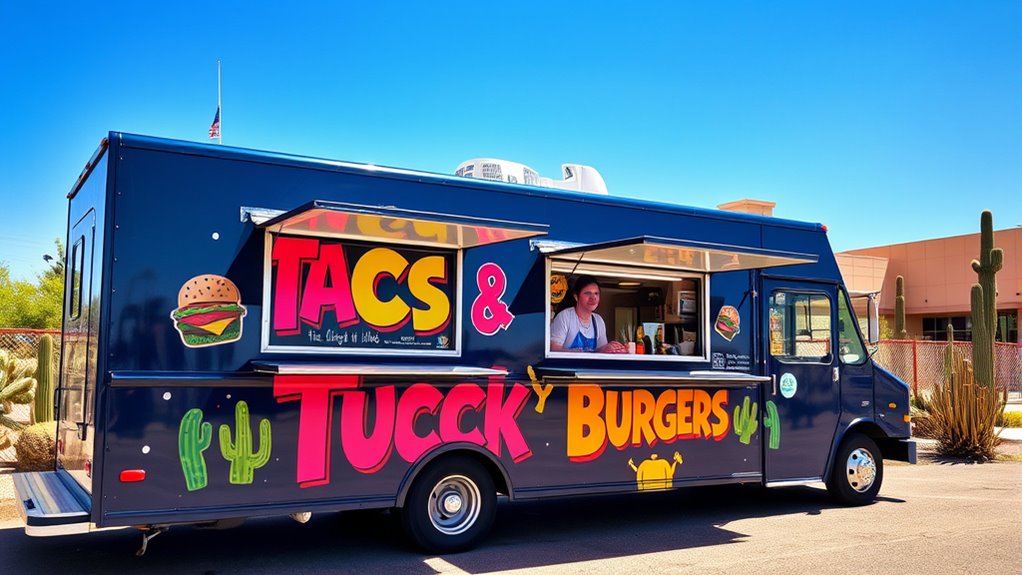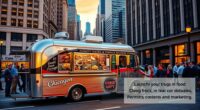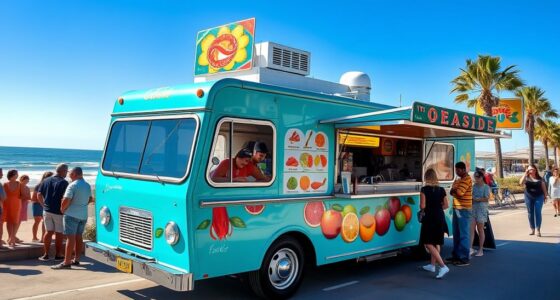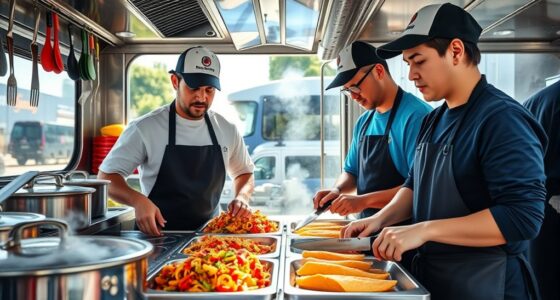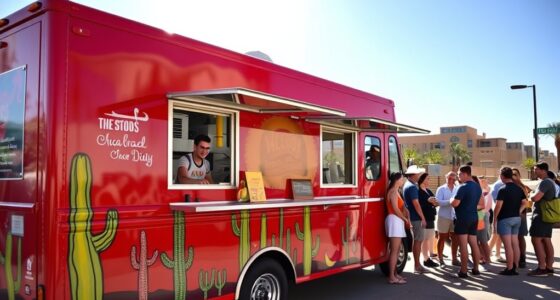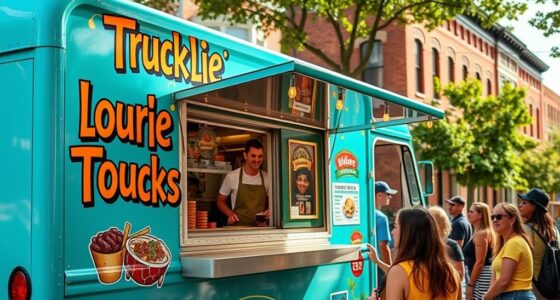To start a food truck in Glendale, AZ, you’ll need to obtain the proper permits, register your vehicle, and comply with health and safety regulations. Set up your operations with a licensed commercial kitchen and plan your vehicle’s outfitting costs. Develop a menu with competitive pricing, source ingredients locally, and invest in technology to streamline sales. Focus on marketing at local events and festivals to boost visibility. If you keep going, you’ll find step-by-step guidance to turn your food truck dreams into reality.
Key Takeaways
- Obtain necessary permits, licenses, and health inspections from Glendale and Arizona authorities for legal operation.
- Choose a suitable commercial kitchen or shared space and customize your food truck layout for efficiency and compliance.
- Develop a detailed financial plan covering vehicle costs, licensing, insurance, and ongoing expenses.
- Plan participation in local events like festivals and farmer markets to boost visibility and build community presence.
- Implement food safety practices, parking regulations, and marketing strategies to ensure smooth operations and customer engagement.
Starting With a Food Truck License
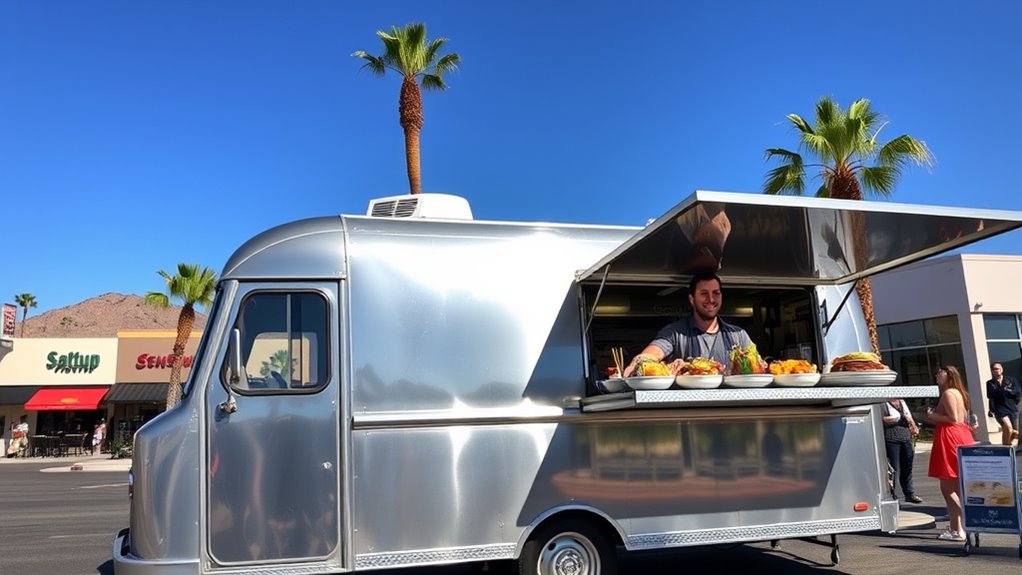
Getting your food truck license is the essential first step to hitting the streets in Glendale, AZ. To do this, you need to secure the proper food truck permits, which guarantee your vehicle meets health and safety standards. The licensing requirements involve submitting proof of insurance, passing health inspections, and providing your business credentials. You’ll also need to register your truck with the Arizona Department of Transportation. It’s important to research local regulations to understand specific permit types and renewal processes. Additionally, understanding the side effects of juice detox can help you maintain your health while managing a busy food truck schedule. By completing these steps, you demonstrate your commitment to compliance and safety. Once your food truck permits are approved, you’ll be ready to operate legally and focus on serving delicious food to customers around Glendale.
Understanding Local Requirements
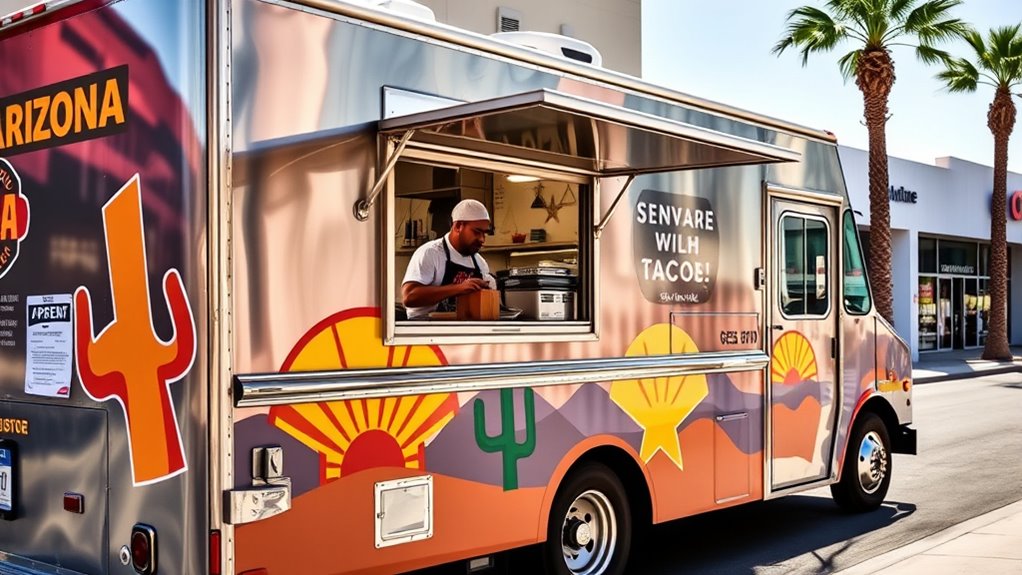
To operate a food truck in Glendale, AZ, you need to understand the local requirements, including the online application process, daily temperature log rules, and designated parking zones. These regulations make sure your business runs smoothly and stays compliant with city laws. Familiarizing yourself with these points helps you avoid potential issues and keeps your truck on the road. Additionally, being aware of regulatory compliance challenges can help you navigate any legal changes affecting your operations.
Online Application Process Overview
When applying for a food truck permit in Glendale, AZ, understanding the local online application process is essential. You’ll need to navigate the city’s digital portal to submit your documents and forms. Imagine logging into a user-friendly platform that guides you through each step. First, you upload your detailed menu and proof of food safety training. Second, you schedule your necessary health inspections and submit inspection reports. Third, you complete your online application form, ensuring all required information is accurate. The city’s system helps streamline approval, but remember, food safety and health inspections are critical. Be prepared to respond promptly to any requests for additional information to avoid delays. Staying organized and attentive makes the process smoother and gets your food truck ready to roll faster.
Daily Temperature Log Requirements
Because maintaining proper food safety standards is essential, Glendale requires food trucks to keep a daily temperature log to monitor storage and preparation conditions. This log helps ensure proper temperature regulation, preventing bacterial growth and foodborne illnesses. You must record temperatures of refrigeration units, freezers, and cooked foods at regular intervals. The climate impact in Glendale, such as high daytime temperatures, makes consistent monitoring even more critical. Accurate logs demonstrate your commitment to safety and are necessary during inspections. Be sure to log each entry clearly, noting date, time, and temperature readings. Regularly reviewing these logs helps you identify issues early, maintaining food quality and compliance. Staying diligent with temperature regulation safeguards your customers and keeps your truck operating within local health standards.
Designated Truck Parking Zones
Understanding where you can park your food truck is essential to staying compliant with Glendale’s regulations. Glendale designates specific truck parking zones to ensure adherence to parking regulations and zoning restrictions. These zones are typically marked with signs and may include areas like commercial districts, event spaces, or designated curbside spots. Picture yourself pulling into a clearly marked zone, where parking your truck won’t cause issues with local ordinances. To stay compliant, you’ll want to know:
- Locations with approved parking zones for food trucks.
- Times when parking is permitted or restricted.
- Any special permits required for certain zones.
Setting Up Your Base of Operations
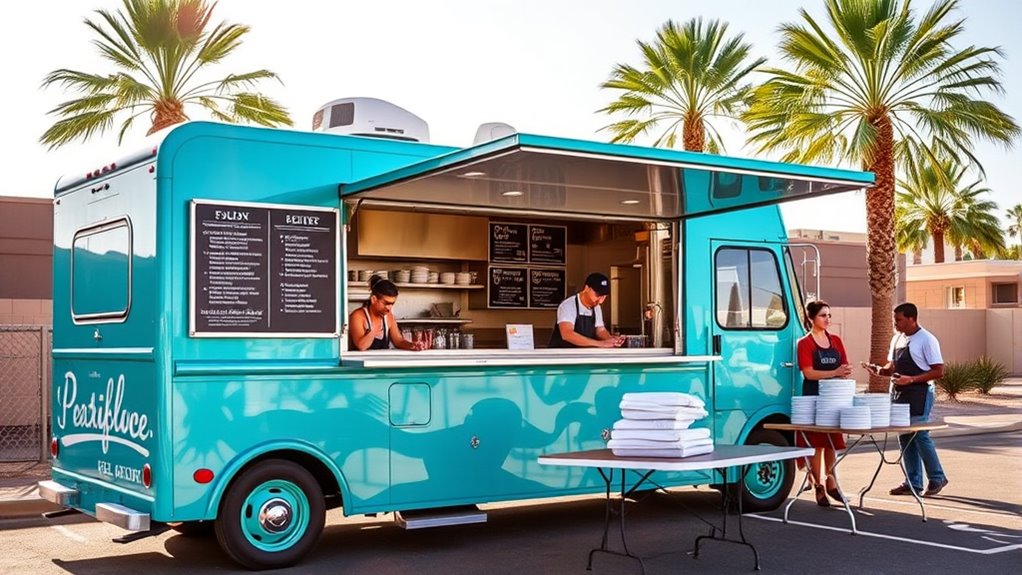
Choosing the right shared kitchen licensing options can save you time and money, so it’s worth exploring local facilities. Planning a custom kitchen layout guarantees your space meets your specific cooking needs and complies with health regulations. By focusing on these points, you set a strong foundation for your food truck operation in Glendale. Additionally, understanding paint sprayer performance metrics can help you select the best equipment for your painting projects, ensuring quality results and long-term durability.
Shared Kitchen Licensing Options
Setting up your food truck in Glendale often involves selecting the right licensing options for your kitchen. Shared space kitchens offer a flexible, cost-effective solution for obtaining the necessary kitchen licensing. Imagine walking into a fully equipped commercial kitchen where you can prepare your menu without building your own facility. These shared kitchens typically include:
- A licensed commercial kitchen with all required health certifications
- Access to storage areas for ingredients and supplies
- Facilities for cleaning, cooking, and packaging your food
Custom Kitchen Layout Planning
Have you considered how a well-designed kitchen layout can streamline your food truck operations? A custom kitchen layout tailored to your urban cuisine ensures efficient workflow and maximizes space, allowing you to prepare diverse menu items quickly. When planning, think about your menu customization needs—design zones for grilling, storage, and prep areas that support your signature dishes. Prioritize safety and hygiene by integrating proper ventilation and easy-to-clean surfaces. Consider the types of equipment you’ll need and their placement to reduce movement and save time. A thoughtfully planned kitchen helps you serve fresh, high-quality food while maintaining a smooth operation. With clever layout planning, you’ll be ready to adapt to customer demands and stand out in Glendale’s vibrant food truck scene.
Budgeting and Financing Your Food Truck
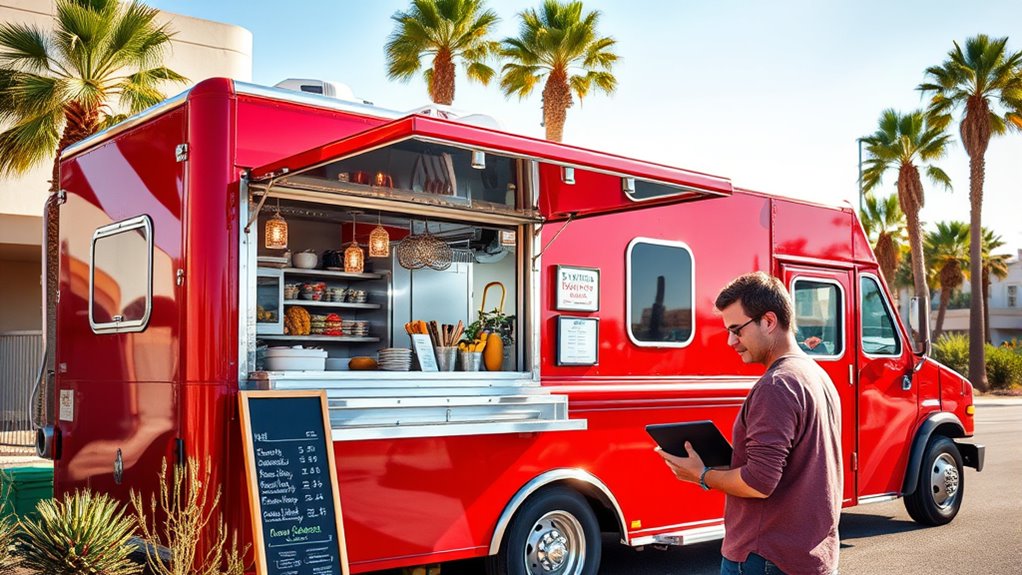
Before launching your food truck, you need to plan your budget carefully, including initial vehicle outfitting costs and insurance. Financing options like vehicle loans can help manage upfront expenses, while liability insurance safeguards your business. Understanding these financial aspects ensures you’re prepared to turn your food truck dream into reality. Additionally, understanding financial planning is crucial to avoid common pitfalls and ensure long-term success.
Initial Vehicle Outfitting Costs
Starting your food truck venture requires a clear understanding of initial vehicle outfitting costs, which can vary considerably based on your menu and equipment needs. Your costs will include outfitting the truck with essential appliances and storage. Imagine:
- Installing commercial-grade ovens, grills, and refrigeration units
- Customizing the interior for efficient workflow and food safety
- Upgrading the vehicle for better vehicle maintenance and fuel efficiency
These investments directly impact your daily operations and long-term expenses. Proper outfitting ensures your truck runs smoothly, minimizes breakdowns, and keeps fuel costs manageable. Remember, well-planned outfitting reduces ongoing vehicle maintenance costs and improves fuel efficiency, helping you stay profitable from day one. Prioritize quality and functionality to set a solid foundation for your Glendale food truck business.
Vehicle Financing Programs
Securing the right financing options is essential to making your food truck dream a reality without draining your savings. Vehicle leasing can be a smart choice if you want lower upfront costs and flexible terms, allowing you to upgrade or change trucks more easily. Alternatively, a credit application for a traditional loan might offer you more ownership and long-term benefits, but it requires thorough credit checks. Before applying, review your credit score and gather financial documents to improve your chances. Some lenders specialize in vehicle financing for small businesses, making it easier to find affordable rates. Whether you choose leasing or a loan, compare offers carefully to find the best fit for your budget and goals. Proper financing sets the foundation for your food truck success.
Liability Insurance for Food Trucks
Liability insurance is a vital expense to contemplate when budgeting and financing your food truck, as it protects you from costly claims and legal costs. Proper insurance coverage ensures you’re protected against incidents like customer injuries, property damage, or accidents involving your vehicle. Without adequate liability protection, a single mishap could threaten your business’s future.
Imagine:
- A customer slips on a spilled drink and sues for medical expenses.
- Your truck accidentally damages a vendor’s property.
- An accident causes injuries to a bystander, leading to legal action.
These scenarios highlight why liability insurance is essential. It offers peace of mind, helping you manage risks and keep your food truck operation running smoothly.
Designing Your Menu and Pricing Strategy

When designing your menu and pricing strategy, consider how ingredient sourcing impacts costs and quality. You’ll also want to control portions carefully to maintain consistency and maximize profit margins. Balancing these factors helps you set prices that attract customers while ensuring your food truck stays profitable. Incorporating cost-effective storage solutions can further optimize your inventory management and reduce waste.
Ingredient Sourcing Strategies
Designing your menu and pricing strategy begins with sourcing ingredients that balance quality and cost. To stand out, focus on unique, fresh ingredients like vibrant fresh herbs and rich artisanal cheeses. These elevate your dishes and appeal to customers seeking quality. Consider these sourcing strategies:
- Partner with local farmers for fresh herbs, ensuring peak flavor and supporting the community.
- Find specialty cheese suppliers who offer artisanal options, giving your menu a gourmet touch.
- Negotiate with wholesalers to get the best prices on staple ingredients, freeing up budget for premium items.
Portion Control and Markup
Effective portion control and accurate markup are essential for ensuring your food truck remains profitable while offering satisfying portions. You need to carefully determine portion sizes that satisfy customers without overusing ingredients or increasing waste. Consistent portion sizes help build trust and manage costs effectively. When developing your markup strategies, consider ingredient costs, labor, and overhead to set competitive yet profitable prices. Proper markup strategies balance affordability with profit margins, ensuring each item contributes to your bottom line. Using a standardized approach for portion control prevents discrepancies and keeps your food consistent. Regularly review your portion sizes and pricing to adapt to ingredient cost fluctuations and customer preferences. Staying vigilant with portion control and markup strategies ensures your menu remains sustainable and profitable in Glendale’s competitive food truck scene.
Technology and Operations
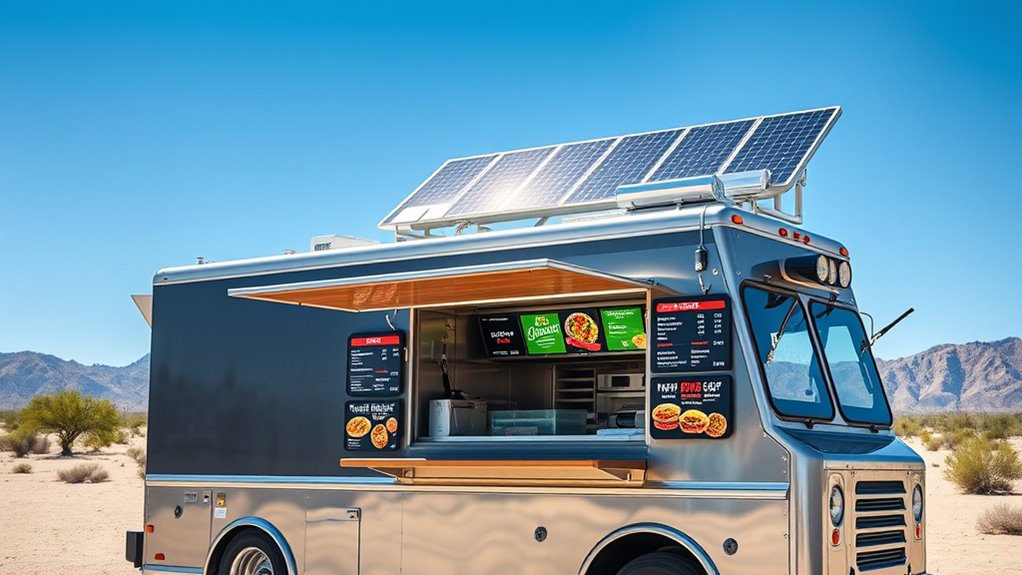
Using a wireless card reader can streamline your sales process and reduce checkout times. Real-time stock tracking software helps you stay on top of inventory levels and avoid shortages. Incorporating these technologies guarantees your food truck runs smoothly and efficiently throughout the day.
Wireless Card Reader Options
When choosing a wireless card reader for your food truck, it’s essential to take into account the variety of options available that can streamline your payment process. These devices enable quick, secure transactions, making mobile payment and contactless payment options effortless for your customers. Picture yourself handling orders smoothly with a device that fits comfortably in your hand.
Here are some popular options:
- Compact, portable readers that connect via Bluetooth, perfect for busy locations.
- All-in-one systems that combine card reading with a cash drawer.
- Contactless-enabled devices that accept tap payments from smartphones and cards.
Choosing the right wireless card reader enhances efficiency and customer satisfaction, ensuring your food truck runs smoothly.
Real-Time Stock Tracking Software
Implementing real-time stock tracking software can substantially boost your food truck’s efficiency by providing instant updates on inventory levels. This technology streamlines inventory management, so you always know what’s in stock, reducing waste and preventing shortages. With accurate data, you can better coordinate supply chain logistics, ensuring you order supplies just in time and avoid overstocking. Real-time tracking helps you identify fast-moving items and adjust your menu accordingly, maximizing profit. It also minimizes manual counting, saving time and reducing errors. By integrating this software into your operations, you gain better control over inventory and supply chain processes, leading to smoother daily functions. Overall, real-time stock tracking software is an essential tool to keep your food truck running efficiently and profitably in Glendale, AZ.
Marketing and Growing Your Presence
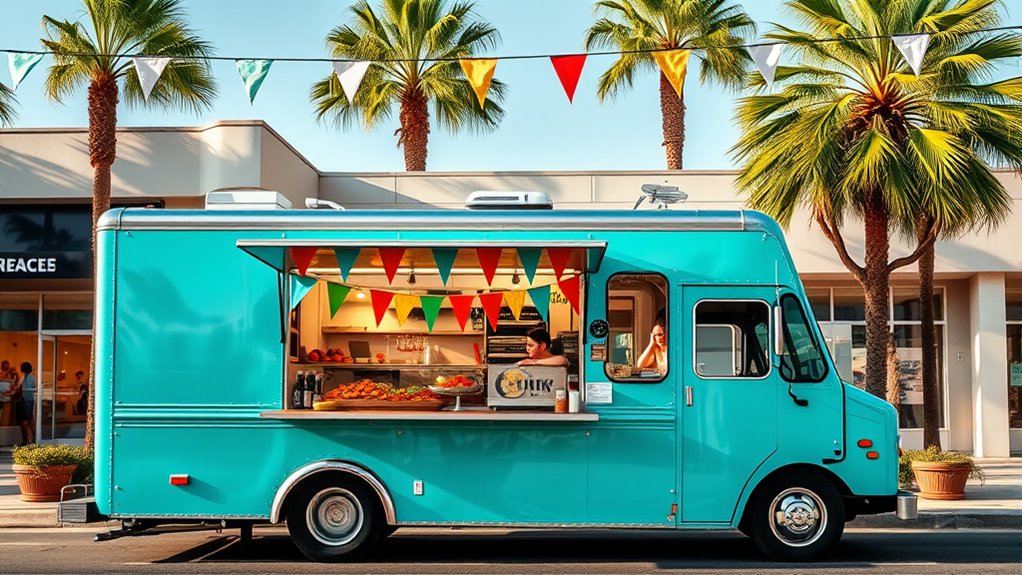
To grow your food truck’s presence in Glendale, you should take advantage of popular local event schedules to reach more customers. Implementing customer loyalty programs can encourage repeat visits and build a loyal following. By combining these strategies, you’ll boost your visibility and create lasting relationships with your community.
Popular Local Event Schedules
Scheduling your food truck at popular local events is essential for building visibility and attracting new customers in Glendale. These events draw crowds enthusiastic to try new tastes, giving you a perfect chance to showcase your food truck design and menu customization. Visualize your truck decked out in vibrant colors, with a sleek setup that catches eyes from afar. Picture a bustling crowd gathered around, sampling your signature dishes. Think of the excitement as customers share their favorites on social media, spreading your name. To maximize impact, target events like farmers’ markets, music festivals, and sporting events. Each one offers a unique opportunity to connect with new audiences and grow your presence in Glendale’s vibrant food scene.
Customer Loyalty Programs
Ever wondered how to turn first-time customers into loyal patrons? Customer loyalty programs are key. By offering loyalty rewards, you encourage repeat visits and boost customer retention. Create a simple system, like punch cards or a mobile app, that rewards customers for their patronage. For example, after five visits, give them a free meal or discount. Make sure your program is easy to understand and accessible. Promote it at your truck and on social media to attract new customers and remind existing ones. Consistent rewards make customers feel appreciated, increasing their chances of returning. Over time, these programs help you build a loyal customer base, ensuring your food truck’s sustained growth and success in Glendale, AZ.
Local Event Calendar Tips
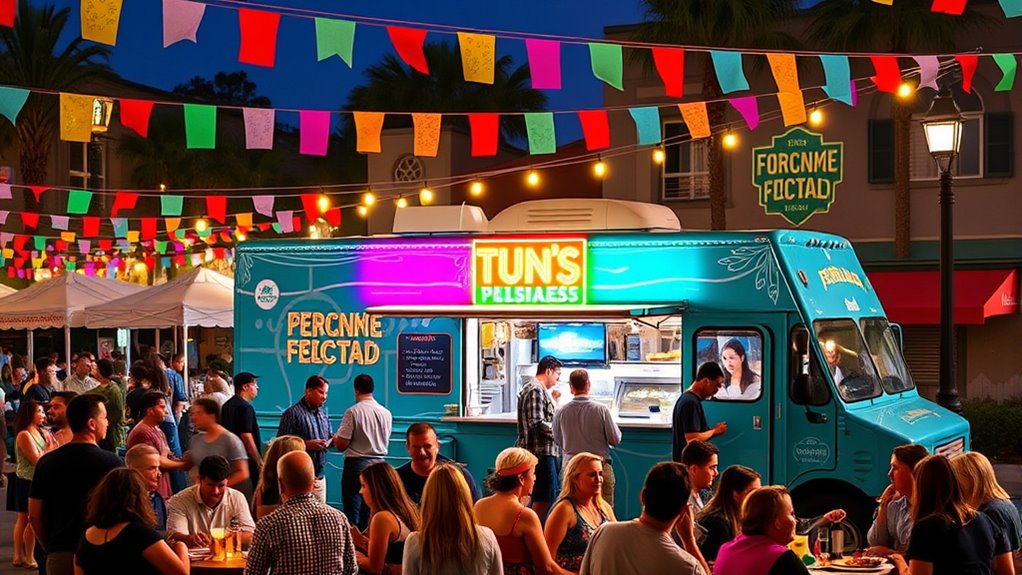
Keeping your eye on the local event calendar is essential for discovering the best food truck happenings in Glendale, AZ. It helps you stay ahead of upcoming opportunities to showcase your truck at popular events like food truck festivals and local farmer markets. To make the most of it, look for these key details:
- Dates and times of food truck festivals—these attract large crowds and boost visibility.
- Listings for local farmer markets—perfect spots to connect with community members regularly.
- Special event notices—parade days, seasonal festivals, or holiday markets that draw extra foot traffic.
Frequently Asked Questions
What Are the Most Popular Food Truck Cuisines in Glendale?
You’ll find that tacos, burgers, and gourmet sandwiches top the food truck menus in Glendale. Popular food trends like fusion dishes, plant-based options, and artisanal snacks also attract plenty of customers. To stand out, focus on offering unique takes on these cuisines or incorporate trending ingredients. Staying current with food trends and customizing your menu to local tastes can help you draw a loyal crowd.
How Long Does It Take to Get a Food Truck License in Glendale?
Picture yourself behind the wheel of a vibrant food truck, the aroma of sizzling food filling the air. In Glendale, AZ, obtaining your food truck permits generally takes about 2 to 4 weeks, depending on your preparedness. The licensing process involves submitting applications, passing health inspections, and paying fees. Stay organized and patient, and you’ll be serving delicious eats in no time, turning your dream into a bustling reality on the streets.
Are There Specific Glendale Business Taxes for Food Trucks?
Yes, there are specific Glendale business license fees for food trucks, and you’ll need to pay for food truck permits to operate legally. Glendale requires you to obtain a business license and permits, which have associated fees. These costs vary depending on your truck size and operation scope. Make sure to check with Glendale’s local government for the latest fee schedule and permit requirements, so you stay compliant and avoid fines.
What Are the Best Locations for Food Trucks in Glendale?
Imagine parking your food truck near downtown Glendale’s popular events or during Glendale tourism festivals, where foot traffic surges. These areas attract visitors and locals alike, making them prime spots to maximize your sales. Make sure you secure the necessary food truck permits before setting up. By targeting busy event zones and high-foot-traffic areas, you boost visibility and sales, aligning perfectly with Glendale’s vibrant tourism scene.
How Can I Partner With Local Glendale Events for Food Truck Opportunities?
You can partner with local Glendale events by reaching out to organizers to explore local event sponsorships and community collaboration opportunities. Attend city council meetings or local business groups to network and showcase your food truck. Offer to sponsor or provide catering for events, which builds visibility. Building relationships with event organizers and participating in community activities helps you gain exposure and establish your food truck as a valued local fixture.
Conclusion
Starting your food truck in Glendale, AZ, is an exciting journey. Imagine serving happy customers at local events, just like Maria did, turning her passion into a thriving business. With the right licenses, a solid plan, and a bit of creativity, you’ll build a community around your food. Stay committed, adapt to the local scene, and soon, your food truck will become a beloved part of Glendale’s vibrant food culture.
